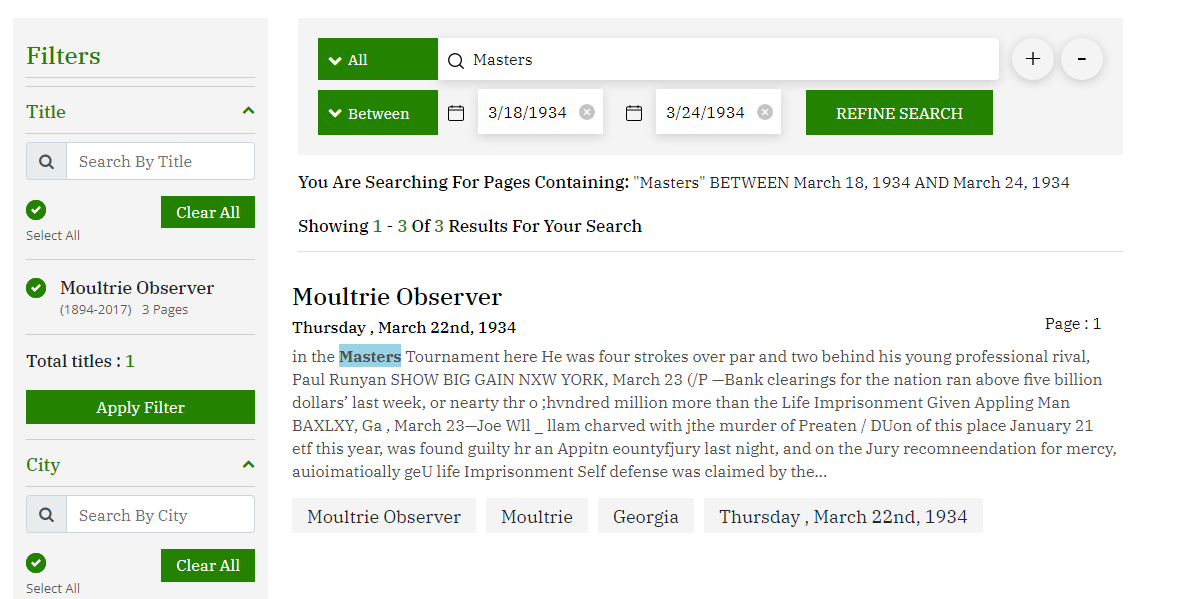Sydney Vaughan is a student at the University of Iowa majoring in Communications, and minoring in History. Sydney has previously used the Community History Archives to complete projects for her University level courses, and kindly agreed to write a weekly guest blog for us. She will be covering both the events of “This Week in History” and how she leverages the Community History Archives to research them:
This week in history marked various historical events, both well-known and less spoken about. From pandemics, to golf, to explosions, March archival content provides plenty of information about these very days many years ago. Using resources provided by Advantage Archives, I have found my favorite events from history for this week and organized them into five different periods. I have also included how I found this content in the archives so that you can go dig into the subject deeper if you want!
The Digital and Information Age (2000s – Present): The COVID-19 Pandemic Begins, 2020
On March 19th, 2020, confirmed cases of COVID-19 had just begun to appear in the state of Iowa. At this time, there were only a total of 38 reported cases. I find it interesting to read this and think we had no idea what the COVID-19 pandemic had in store for the world. To have 38 cases was extremely alarming then, but in retrospect seems like almost nothing in comparison to the amount of cases the state ended up having throughout the pandemic. To find this piece, I went to the Cedar Rapids Public Library Community History Archive (https://cedarrapids.historyarchives.online) because I knew it had content from the 2020s. I refined my search down to the dates of this week specifically, and searched for the term “COVID”. I scrolled through the results and found this article which perfectly reflected the very beginning of this world-changing pandemic.
The Late 20th Century: Cold War and Globalization (1980s – 2000s): President Carter calls for the United States to boycott the 1980 Summer Olympics
On March 21st, 1980, a group of Olympic athletes met with President Carter to discuss a potential boycott of the 1980 Summer Olympics in Moscow. The call for a boycott came in response to the Soviet presence in Afghanistan. There were 97 athletes in attendance to listen to Carter’s speech, described as “sometimes emotional”, about why he believed they should boycott that year’s Olympics. The Carter administration also proposed an alternate international competition in place of the Summer Olympics. Following Carter’s speech, 44 opposed the boycott, 29 athletes voted in support of the boycott, and 24 abstained from voting. However, Carter’s mission eventually succeeded, and the 1980 Summer Olympics ended up being boycotted by 65 countries, including the United States.
To find this article, I started by looking at various archives from libraries across the east coast, hoping to find something close to Washington DC, but there wasn’t much on this specific topic. Because of this, I decided to turn back to the Cedar Rapids Public Library CHA (https://cedarrapids.historyarchives.online), because I knew they had an extensive database where I have had lots of success in the past. I refined my search to March 18th, 1980 through March 24th, 1980, and used the word “Olympics”. My search produced many results, so I browsed through them to find the one that I thought was the most informative and decided on this piece from the Gazette, which provided new insight into how the boycott was received.
Post-War Prosperity and Challenges (1945 – 1980s): Closing of Alcatraz Prison, 1963
For this period, I chose an event for a location I am fascinated with: Alcatraz Island. On March 21st, 1963, Alcatraz Prison closed down after 29 years of operation. Located in San Francisco Bay, the prison was home to some of the most notorious criminals, such as Al Capone and Robert “Birdman” Stroud. The prison was incredibly expensive to run, as it was constantly subjected to harsh weather conditions due to its location. The constant deterioration of the facility is why on this week in 1963 it closed its doors as a prison. Some believe the prison closed its doors following the escape of three prisoners in June of 1962, however, that is not the case. The facility was simply eating too much of the money going into it and was no longer a sustainable way of holding these dangerous individuals.
Alcatraz Island is a fascinating place, and has been turned into a National Park for people to visit and see what life was like on “the rock”. The prison is still mostly in its original condition, with some minor repairs to the building to make it accessible for tourists. If you visit, you can see the different prison cells, the cafeteria, and even the cell which the Anglin brothers escaped from. Some buildings, such as the warden’s house, are in total disrepair and are now just a shell of what they used to be. I got the chance to visit last year, and getting to see that history firsthand was an incredible experience. If you are a fan of history, I highly recommend going and seeing Alcatraz Prison.
To find this article, I started in the California archives, as Alcatraz Island is located in California. However, my search did not turn up many results, so I instead turned to the Cedar Rapids Public Library site (https://cedarrapids.historyarchives.online) once again. I refined my search to this week during the year 1963, with the word Alcatraz, and immediately found exactly what I was looking for in The Gazette.
The World Wars Era (1914 – 1945): First Master Tournament Held in Augusta, Georgia, 1934
For this period, I knew I wanted to focus on the first Masters tournament being held in Augusta, Georgia in the year 1934. Because of this, I headed to the Community History Archive of the Moultrie Colquitt County Library System in Georgia (https://moultriecolquitt.historyarchives.online) to find local pieces from this week. I refined my search to the word “masters” and the dates 03/18/1934 to 03/24/1934. Those search details led me to find this small but important part of that week’s newspaper.
Here, I learned about Bobby Jones and his return to golfing during the masters tournament. Bobby Jones was a professional golfer from Atlanta, Georgia. During his professional golf career, Jones won 9 PGA tours before he retired from golf at the age of 28 and instead focused his attention on founding the Augusta National Golf Club. He returned after four years of retirement from golf to help found and compete in the Masters Tournament at Augusta National Golf Club. The very first masters tournament was held on March 22, 1934. Jones ended the day four strokes over par and two strokes behind his rival. This first masters tournament marked the start of a yearly golf championship which still takes place every year at the Augusta National Golf Club.
The Industrial Revolution to the Early 20th Century (1824 – 1914): New Jersey Powder Works Explosion, 1899
This event was quite a challenge to track down. I had no idea where to begin with this period, so I decided to go to the Cedar Rapids Public Library Archive yet again. I put in the years for this period and searched for certain buzz words like “fight”, or “law”, and eventually found something interesting with “explosion”. I found this article in the Cedar Rapids Evening Gazette and was intrigued, so decided to look it up to see what other information I could find on this. That’s where I got lost. There seemed to be almost nothing on the internet about this event. However, I did eventually find a New York Times article from 1899 also reporting on the explosion, but it didn’t give me much more information. Here is what I gathered from my research:
On March 22nd, 1899, an explosion occurred at the E. I. Dupont Powder Works at Carney Point, New Jersey. The explosion took place in the drying house and destroyed both the drying house and the storehouses. At the time, no cause was identified for the explosion, and I was not able to find any more information on the cause. Three men were killed, six were seriously injured, and almost a hundred more people were hurt. This was one of many Dupont Powder Works explosions that took place during their operation.
This event is the perfect example of why archival content is so important. There are so many events like these that are practically untraceable on the internet and can only be found within old publications. Without digitizing these archives, we would have practically no knowledge that events like this ever took place. Further, without archival content, we would lose many of our primary sources for historical events, and with it the insight into the thoughts of the people living through them.




